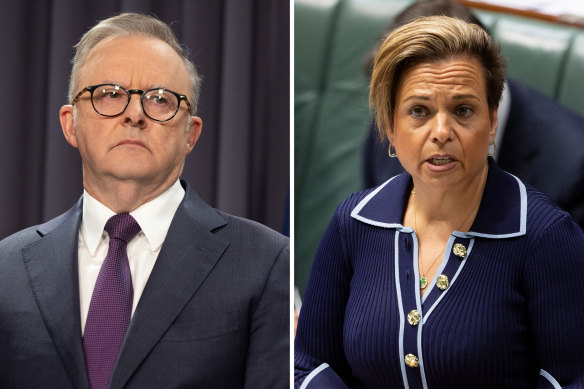Gambling bosses are hoping to sweet-talk Labor ministers in a bid to overturn a proposed ban on sports betting advertising on social media at a series of events this week, after being blocked from talking to Prime Minister Anthony Albanese and the minister in charge of the legislation.
Betting giant Sportsbet has paid for a $110,000-a-year “platinum” membership that gives it access to Labor’s fundraising forum, whose major gathering, which started on Wednesday night and finishes on Friday, is attended by the prime minister and his cabinet.

Wagering company sources said that, in effect, they had been barred from dealing with Prime Minister Anthony Albanese and Communications Minister Michelle Rowland at fundraising events.Credit: Alex Ellinghausen
Several sports betting executives, including those from peak body Responsible Wagering Australia, which pays about $70,000 to the donor club, are in the crowd.
But unlike bankers seeking out the treasurer and miners pursuing the resources minister, sports betting figures will not get access to their key targets.
Wagering company sources said that, in effect, they had been barred from dealing with Albanese and Communications Minister Michelle Rowland at fundraising events, including being blocked from certain events at which the pair were the only politicians. The directive is at odds with this week’s claim by independent MP Zoe Daniel that Rowland was “conspiring with the sector to try to enable them to continue grooming young people”.
Albanese and Rowland have not met any sports betting executives or representatives for the sector in more than a year, according to Labor and industry sources.
The sources, speaking anonymously to reveal the dynamic between the industry and Labor over the legislation, said Rowland’s ban on meetings with the sector came around the same time that this masthead reported she had received nearly $20,000 in donations from Sportsbet before the last election. That story prompted calls from crossbenchers to resign her portfolio.
This masthead reported last week that Labor is proposing to prohibit gambling ads on digital and social media and impose a frequency cap on TV ads.
Anti-gambling campaigners and crossbench MPs are furious that the plan – which comes more than a year after a parliamentary inquiry recommended a ban on all gambling ads within three years – does not go further.
Big bookmakers wanted Labor to back down on the digital ban, sources said, and instead take a “three-lock” approach that would only allow ads on platforms that do not target children, let people opt out of seeing gambling ads, and limit ad frequency.
Blocking ads online but allowing them on broadcast television would cut off cash flow for foreign-owned social media firms but maintain tens of millions of dollars in revenue for locally owned TV and sports businesses.
The government hired a consultant to examine how a blanket ban would hit the bottom lines of sports and media companies, the latter of which have recently laid off staff. The results of the consultant’s work have not been made public.
More than 1 million gambling ads aired on free-to-air TV, radio and online in the 12 months to April 2023, at a cost of $238 million. This figure had dropped in the past year, gambling sources said, as companies adjusted their behaviour in anticipation of a crackdown.
Daniel, a first-term MP from Melbourne, issued a correction this week after releasing a statement that said “gambling interests had no fewer than 66 meetings with [Rowland] and/or her office” in six months. The correct figure was 40, with the others being a mix of anti-gambling and public health groups.
Of the 40 meetings cited as “gambling interests”, 10 were with gambling firms, while the remainder were TV companies and sporting bodies. The 10 meetings with betting companies were with Rowland’s staff, not the minister.
A spokeswoman for Rowland said: “The minister continues to engage with stakeholders regarding the recommendations from the online wagering inquiry as we formulate our response.”
The Labor fundraising event, called the Federal Labor Business Exchange, is being held at Sydney’s five-star Sheraton Grand hotel.
Some Labor ministers have privately expressed frustration at the requirement to attend fundraising events with lobbyists, but give their time to raise money for campaigning and their own election advertising. Labor plans to cut the influence of money in politics by limiting the amount that can be donated to parties and individuals, which would in effect reduce the need for such events.
Cut through the noise of federal politics with news, views and expert analysis. Subscribers can sign up to our weekly Inside Politics newsletter.